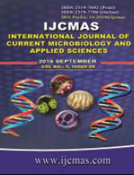


 National Academy of Agricultural Sciences (NAAS)
National Academy of Agricultural Sciences (NAAS)

|
PRINT ISSN : 2319-7692
Online ISSN : 2319-7706 Issues : 12 per year Publisher : Excellent Publishers Email : editorijcmas@gmail.com / submit@ijcmas.com Editor-in-chief: Dr.M.Prakash Index Copernicus ICV 2018: 95.39 NAAS RATING 2020: 5.38 |
Biometric finger printing devices are being more commonly used in both the public and private sectors to record attendance. This system involves the physical contact between the skin and the surface of the device. When successive persons align their fingers on the device there is the chance of the indirect transmission of the microorganisms from one person to another. Many studies have been carried out on the health care workers and also in the community settings as they are more prone to transfer the pathogenic microorganisms. In this study the microorganisms in the fingerprint devices in a tertiary care hospital were studied. This study aims to assess the risk of transmission of pathogenic bacteria through fingerprinting devices by isolating the bacterial flora which may be present in the Biometric fingerprinting device. The swabs were collected from the surface of the biometric fingerprinting device. The collected swabs were inoculated in the Blood agar plate and Mac Conkey agar plate and incubated overnight at 37oC for the isolation of bacteria. The identification of the bacterial isolates was done by performing Gram staining and biochemical reactions. The antibiotic sensitivity testing was done for the isolated pathogen. Of the total of 84 samples that were collected from the surface of the biometric fingerprinting devices, 39 (46%) samples were culture positive. Among the culture positives, Coagulase negative Staphylococcus species (CONS) was the commonest organism to be isolated 19 (49 %), followed by Gram positive bacilli 17 (44 %) and Gram negative bacilli of 3(7%). The 3 Gram negative bacilli isolated were Enterobacter spp., Acinetobacter spp and Aeromonas spp.
 |
 |
 |
 |
 |